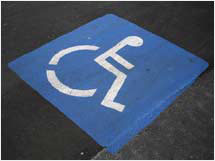Must your business accomodate a customer's pig on a leash?
Only if the porker acts as a seeing-eye guide to the blind, according to one of many new rules and interpretations proposed for the federal Americans With Disabiliies Act.
(Fortune Small Business) -- The Americans with Disabilities Act is about to get a major facelift. For small business owners, this means a raft of new regulations, and some familiar questions: What do I need to do to comply with the ADA? Do I risk a lawsuit if I don't make changes?
The answer depends entirely on what kind of business they run, what disabilities their employees have - and whether they've ever had a customer with a seeing-eye pig.
Signed into law in 1990 by the first President Bush, the ADA has two major mandates: it protects disabled people against workplace discrimination and it provides for handicapped access to places such as restaurants, theaters, and other businesses. Both mandates are about to get some more precise definitions, thanks to Congress and the Justice Department, respectively.
Last week, the House overwhelmingly passed a disabled workers' antidiscrimination bill, 402-17. It is expected to pass the Senate, and could be law by the beginning of 2009. The new measure is designed to broaden the reach of the ADA in answer to a series of court cases over the past decade, such as the 1999 Texas case where a federal judge ruled that an employee with epilepsy did not qualify as disabled - because the employee was taking medication.
According to the new legislation, such "mitigating measures" don't prevent someone from being legally disabled. People who take medication, or use a device such as a hearing aid, become more likely to qualify for the ADA's workplace-discrimination protection. It also benefits employees with diabetes, artificial limbs, and certain mental illnesses. They would be due certain rights from their employers, such as pill breaks during the day or medical leave. Should an owner fire such an employee, her company would be at greater risk of a lawsuit.
"We know this is going to be a lower standard," says Randel Johnson, a vice president at the U.S. Chamber of Commerce, a pro-business lobbying group. "As to how many more people will be covered, that will play out over time."
As if that wasn't enough for owners to deal with, the Department of Justice has come up with new regulations regarding handicapped access to public spaces. The timing is coincidental: the DOJ is charged with periodically revising the ADA. The proposed regulations, laid out in a 1,000 page document, can be read on the DOJ's Web site. But hurry - you've only got until August 15 to comment on them. At that point, the DOJ will weigh the public comments, then finalize the new regulations. Experts say the regulations are likely to be adopted with very few changes, and may also go into effect as soon as the beginning of 2009.
The proposed regulations are mind-numbingly thorough. They cover everything from wheelchair ramps to accessible light switches to bathrooms. An establishment's bathroom sink would need to be placed 2 feet from the centerline of the toilet; 18 inches is the current standard.
Many of the rules are aimed at particular industries. Restaurants would need to make 5% of their seats disabled-accessible, as opposed to 5% of tables (the current rule). Retail counters in small shops would have to provide knee and toe clearance of 17 inches so that customers can roll up in wheelchairs. A sauna must have a door that provides 32 inches of clearance. At least half the holes on a mini-golf course must be configured to accommodate disabled players.
Crucially for small businesses, the DOJ's proposed changes include a grandfather clause. If you meet the current ADA guidelines, you won't have to address the new standards - unless you make a "substantial" alteration to your facility.
Of course, there are ample questions about what constitutes an alteration sufficient to trigger the new regulations. And all that legal grey area could mean costly lawsuits.
"We're about to get new regulations on top of an existing body of difficult regulations," says Minh Vu, ADA counsel to the National Federation of Independent Business. "It's going to be very difficult for small-business owners to figure out what they're supposed to do."
There is at least one area in which the DOJ is offering concessions to the business community. The proposed revisions include a better definition of the types of animals disabled people can bring into restaurants and other businesses. This has been an area of real controversy, according to disability experts. Some customers have been showing up accompanied by all kinds of curious creatures. Very often, the pet-owners' justification - under the ADA - is that the animal is necessary to their comfort and well-being.
"The new guidelines make a distinction between comfort and service. Animals need to be able to perform work tasks like opening doors," says Curtis Decker, executive director of the National Disability Rights Network. Which means no more ferrets, gerbils, or service snakes. ![]()
Turning an illness into an asset: Diagnosed with attention-deficit disorder, an entrepreneur learns to harness his restlessness and redirect it into creativity.
Tax credits for hiring disabled workers
A disabled CEO's $2 million innovation empire
-
The Cheesecake Factory created smaller portions to survive the downturn. Play
-
A breeder of award-winning marijuana seeds is following the money and heading to the U.S. More
-
Most small businesses die within five years, but Amish businesses have a survival rate north of 90%. More
-
The 10 most popular franchise brands over the past decade -- and their failure rates. More
-
These firms are the last left in America making iconic products now in their twilight. More










